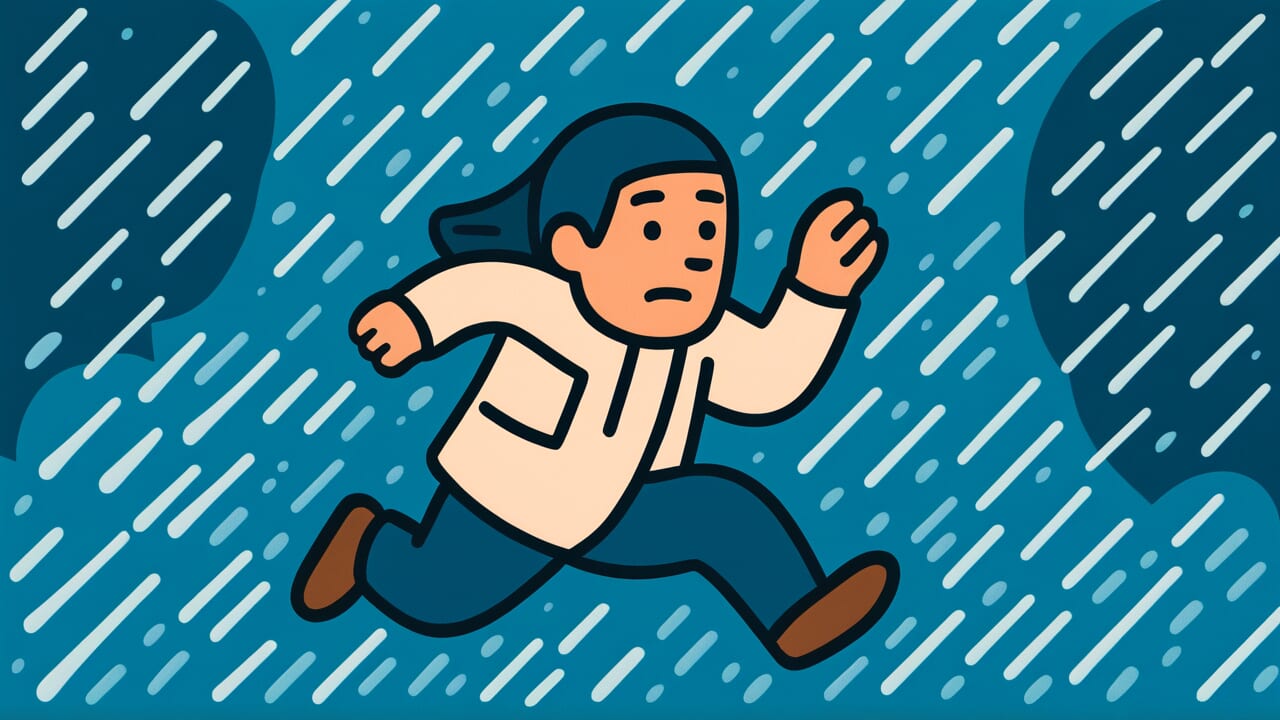How to Read “He that runs in the rain may be wet for nothing”
He that runs in the rain may be wet for nothing
[HEE that runs in the RAYN may bee wet for NUTH-ing]
The phrase uses older English with “that” instead of “who.”
Meaning of “He that runs in the rain may be wet for nothing”
Simply put, this proverb means that rushing into risky situations without good reason often leads to unnecessary suffering or loss.
The literal image shows someone running through rain when they could stay dry. They get soaked but gain nothing from their hurry. The deeper message warns against taking pointless risks. When we act without thinking, we might face problems that bring no reward.
We use this wisdom when people make hasty decisions that backfire. Someone might quit their job without having another one lined up. A student might skip studying to hang out with friends before a big test. These choices often lead to regret because the risk wasn’t worth taking.
What’s interesting about this saying is how it captures human impatience. We often rush toward things that seem appealing without considering the cost. The proverb reminds us that getting wet, tired, or hurt serves no purpose if we gain nothing valuable in return.
Origin and Etymology
The exact origin of this proverb is unknown, though it appears to come from older English folk wisdom. Early forms of this saying likely developed when people relied more heavily on weather patterns for daily activities. The language structure suggests it comes from several centuries ago.
During earlier times, people understood weather risks differently than we do today. Getting caught in rain could mean serious illness or ruined clothing that was expensive to replace. Folk sayings about weather often carried practical survival advice wrapped in memorable phrases.
This type of wisdom spread through oral tradition before appearing in written collections of proverbs. The saying likely traveled through communities as parents taught children about making smart choices. Over time, the meaning expanded beyond literal weather to include any situation involving unnecessary risk.
Interesting Facts
The phrase uses “he that” instead of modern “he who,” showing its age through older English grammar patterns. This construction was common in proverbs from the 16th and 17th centuries.
The word “nothing” in older English often meant “no thing of value” rather than complete absence. This gives the proverb extra meaning about gaining something worthless versus gaining something valuable.
Usage Examples
- Manager to employee: “Don’t panic and rush this proposal overnight – he that runs in the rain may be wet for nothing.”
- Parent to teenager: “Wait to hear back from your first choice college before stressing about backups – he that runs in the rain may be wet for nothing.”
Universal Wisdom
This proverb reveals a fundamental tension in human nature between our desire for immediate action and our need for careful planning. Throughout history, humans have faced the challenge of knowing when to act quickly and when to wait. Our ancestors observed that people often rush into situations because waiting feels uncomfortable, even when patience would serve them better.
The wisdom addresses a core survival mechanism that sometimes works against us. In dangerous situations, quick action can save lives. But in complex social and economic situations, the same urgency can create unnecessary problems. Our brains evolved to respond quickly to immediate threats, but modern life often requires us to resist these impulses and think ahead.
What makes this pattern universal is how it reflects the cost of poor timing. Every generation discovers that enthusiasm without strategy leads to wasted effort. The proverb captures why humans keep making the same mistakes despite having intelligence and experience. We feel pressure to act, even when action serves no clear purpose, because doing something feels better than doing nothing.
When AI Hears This
People choose actions that look impressive over actions that work best. Running in the rain appears brave and determined to others. Standing under shelter looks lazy or scared. We pick the choice that makes us seem heroic. This happens even when no one is watching us.
The need to appear productive controls our decisions more than logic does. We fear being seen as inactive or weak. Taking visible action feels better than smart waiting. Our brains trick us into thinking motion equals progress. This explains why people stay busy instead of being effective.
This urge to perform effort actually helped humans survive in groups. Showing determination earned respect and trust from others. Being seen as a hard worker meant better social standing. The person who runs in the rain signals commitment. Sometimes looking reliable matters more than being perfectly efficient.
Lessons for Today
Living with this wisdom means developing the skill of pausing before taking action. The challenge lies in distinguishing between necessary urgency and manufactured pressure. Most situations that feel urgent actually allow time for basic planning. Learning to ask “What do I gain from acting right now?” can prevent many unnecessary difficulties.
In relationships and work, this wisdom helps us avoid reactive decisions that create more problems than they solve. When someone criticizes us, we might want to respond immediately with anger. When we see an opportunity, we might want to jump in without research. The proverb suggests that these impulses often lead to getting “wet for nothing” – experiencing stress, conflict, or loss without meaningful benefit.
The deeper lesson involves accepting that some discomfort comes from wise restraint rather than missed opportunities. Watching others take risks while we wait can feel frustrating. But understanding that many risks offer poor odds helps us stay patient. The goal isn’t to avoid all risks, but to choose them carefully so that if we do get “wet,” we at least have something valuable to show for it.



Comments